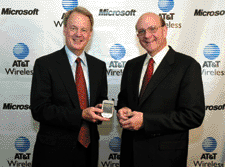Microsoft, AT&T Mobilize Strategy
The two Redmond, Wash., firms last week disclosed an agreement to jointly sell a handheld device using Microsoft's Pocket PC 2002 Phone Edition as well as forthcoming smart phones. The companies said they also have worked together to develop a "one-button" wireless sync capability for notebook users. Other joint plans call for the two to provide over-the-air IT provisioning capabilities as well as wireless location-based services built on Microsoft's .Net technology.

\
(l. to r.) AT&T Wireless CEO John Zeglis and Microsoft CEO Steve Ballmer detail plans for a handheld that uses Pocket PC 2002.
But executives at Microsoft and AT&T Wireless confirmed that the services, slated for availability in the fourth quarter, initially will be sold direct. An indirect channel strategy will be considered in the future, an AT&T spokesman said.
Although wireless carriers often initiate new programs through a direct-sales pitch, solution providers were agitated by their lack of inclusion in this latest project.
"They are missing the bigger picture of the data convergence that is happening in the enterprise," said Dan Elliott, vice president of mobile business solutions at Dallas-based CompuCom. "Enterprise customers have a higher comfort level with systems integrators than with carriers. They are going to need systems integrators to pull together the overall solution and to deliver the requirements the enterprise will have."
Other channel partners aimed their criticisms at Microsoft.
"Microsoft is doing these things in a vacuum. Half of their developers don't know what's going on, and [the developers are not happy about it," said one mobile technology partner, who requested anonymity.
Kirk Wolfe, president of Enterprise Mobility, Florence, Ky., said he's seen similar moves from Microsoft in the past.
"It seems pretty typical of them," he said. "They try to bypass everyone and go direct to corporate heads."
Still, Wolfe maintains that the Microsoft-AT&T Wireless partnership isn't offering any unique services. Enterprise Mobility has been able to offer wireless synchronization and over-the-air provisioning via third-party software for some time, he said. Moreover, companies including Handspring, Kyocera and Samsung already are selling smart phones that offer the same functionality as devices using Microsoft's Pocket PC 2002 Phone Edition, Wolfe said.
Scott Gode, director of marketing at Microsoft, said although partners won't have immediate access to solutions sold around the wireless products and synchronization, they can develop location-based applications that can be used by customers over the AT&T network.
Solutions based on Microsoft's MapPoint .Net framework will be able to utilize location-based information available over the AT&T network in the fourth quarter, Gode said.